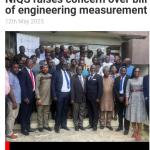The recent disruption of the 2024 Unified Tertiary Matriculation Examination (UTME) in 157 centres across the country has sparked outrage — but more troubling is the peculiar pattern in where this so-called glitch occurred.
According to the Joint Admissions and Matriculation Board (JAMB), nearly 379,997 candidates were affected by technical failures. But a closer look at the breakdown reveals something deeply unsettling: the entire five states of Nigeria’s Southeast region and Lagos — a region of major political and demographic influence — were among the affected zones.
Coincidence? Many are not convinced.
While JAMB’s Registrar has publicly expressed regret and offered reassurances of retakes, critics argue that this is far from an isolated technical failure. To them, this may very well be a strategic dry run — a subtle, silent test ahead of the 2027 general elections.
In a statement by Umoh bassy, “It doesn’t look like a glitch. It looks like a coded rehearsals". The choice of locations — five Southeast states, home to Nigeria’s Igbo population, and Lagos, the commercial capital and stronghold of growing political dissent — raises more questions than it answers.
Some speculate that Lagos may have been included in the disruption pattern simply to create the illusion of neutrality and avoid suspicion of ethnic or regional bias.
In a functional democracy, such an incident — affecting almost 20% of all UTME candidates — would trigger resignations, a sweeping audit of the IT infrastructure, and possibly a full-scale independent investigation. Yet in Nigeria, no heads have rolled. No investigations announced. Just a vague promise of “rescheduling.”
This lack of accountability has led some to connect the dots between JAMB’s “glitch” and the Independent National Electoral Commission (INEC)’s controversial handling of the 2023 elections. The fear? That the same systems and operators behind the UTME disruption could reappear during Nigeria’s most critical civic exercise in 2027.

As Nigerians, we must not dismiss these patterns. We must ask the hard questions:
- Why were all five Southeast states affected?
- Why Lagos?
- Why no clear answers or consequences?
Whether this is a technical error or something more deliberate, silence is not an option. In a nation where institutional manipulation has a long shadow, vigilance is not paranoia — it is responsibility.
Let the people watch. Let the people remember. And let no one pretend this is business as usual.












